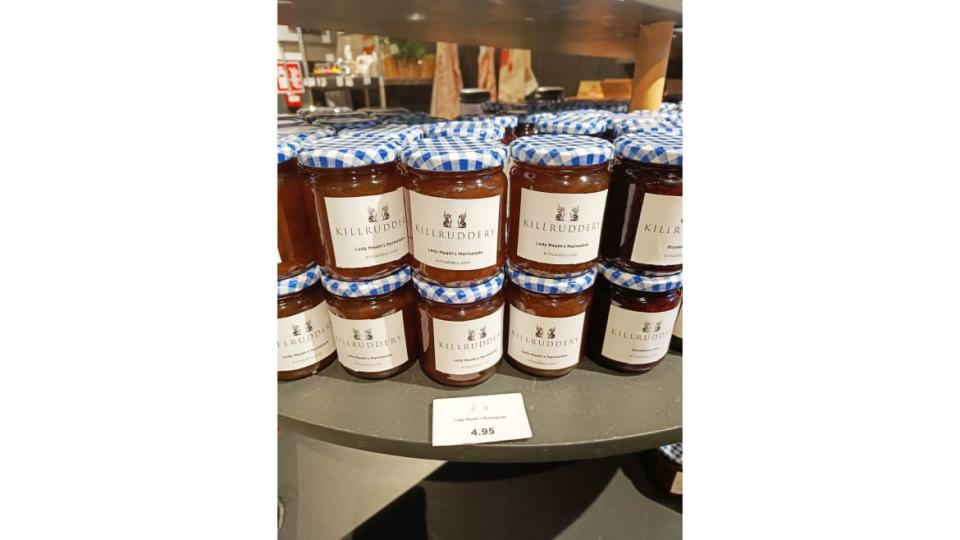Meghan Markle Isn’t Alone: How the Super-Rich Fell in Love With Jam-Making

- Oops!Something went wrong.Please try again later.
Lord Anthony Ardee could tell Meghan Markle a thing or two about the fine art of making—and marketing—posh jam. Ardee is the 15th generation of his family to manage their estate, Kilruddery House near Dublin, Ireland. The house’s magnificent gardens, laid out in the 17th century, are home to a thriving farm shop, which has been selling jam and other preserves for several years.
He told The Daily Beast: “Jam is not new, and we began making it for the same reason people have always made jam; a glut of fruit in the garden which needed to be preserved. We still use the traditional family recipes and make it all here in the house kitchen.”
Ardee estimates that they make a few thousand pots a year, selling for between €5 ($5) and €8 ($8.50) a pot. Strawberry jam is the cheapest; their damson jam, made from the fruit of a single tree in the walled garden, typically commands a higher price. While this may qualify as a pretty penny in the wilds of Ireland, it’s unlikely to make much of a dent in the Sussex family’s monthly Montecito outgoings.
Instagram Goes Gaga for Meghan Markle’s American Riviera Orchard Jam Pots
But cash certainly can be made out of selling posh jam and other artisan goods to the masses if you get the formula right: witness the astonishing success of Lady Carole Bamford’s Daylesford Organic brand, not to mention the brand founded by King Charles, Duchy Originals, which was bought up by the high-end British supermarket Waitrose and became Duchy Organic.
Bizarrely, Charles’ own brand, Highgrove (named after his country home), saw a spike in organic strawberry jam sales following Meghan’s guerrilla launch of the American Riviera Orchard brand this week: Meghan sent limited-edition pots of strawberry jam to friends who then posted the pots on their Instagram Stories.
Others in the posh jam game have observed the same phenomenon. One peer, a baronet with a Palladian mansion in the English countryside, who wanted to remain nameless in part because they no longer make their own jam, said they had also seen an unexpected uptick in sales this week. “We sold seven pots on Wednesday,” he said, “that’s six more than a usual weekday. It was quite extraordinary. A rising tide lifts all boats, I suppose.”
Indeed, the guilty secret of many stately home farm shops is that the produce in them is less and less likely to come from the grand estate on which they are parked as time goes by. “At the beginning, it was all our own stuff, but we’d have a few hundred people on a good day. Now the place is buzzing but we have to get other people to help us produce the goods,” said the shame-faced white-label peer.
But white labelling (when a company makes products with no branding and pops them in another company’s branded jars for them) is really the only answer to growing success. One of the most popular white-label suppliers to high-end farm shops is Fruits of the Forage, one of the U.K.’s best loved small batch jam and chutney makers, based in northern England, that makes all its jam from fruit either foraged or sourced from traditional orchards.

Jam
Archie Thorneycroft, who runs Fruits of the Forage with his brother Fred, told The Daily Beast: “What makes us different is we try and pick fruit that would otherwise go to waste from the hedgerows, like damson and plums.”
Asked what he thought of the look of Meghan’s strawberry jam, he said: “We don’t usually do a strawberry jam because everyone does strawberry jam. We slander it a bit because the reality is that most of them in the U.K. are made with frozen strawberries shipped in from Egypt.”
He attributes the rise in “posh jam” to the wider artisan food explosion and the fact that “stately homes are brands these days. And if you already have a brand, like the farm shops we white-label for, it makes sense to expand the brand with white-label products.”
Note to Meghan: Archie says Fruits of the Forage would be “only too delighted” to make some white-label jam for her American Riviera Orchard brand, “if she orders a minimum of 50 jars.”
Jam-makers in general are a collegiate lot. Kim Stephens, of the U.S.-based Peace Love & Jam Society, responded to a request for comment on the appearance of Meghan’s jam by saying: “Hard pass on providing a critique on a fellow jam-maker’s choices, unless that request were to come directly from them.”
Stephens cautions, however, that it can be difficult to retain quality as quantity scales up, saying: “Can commercially produced jams and jellies have the same qualities as small batch production? No, and that is my personal opinion.”
The British PR guru Mark Borkowski told The Daily Beast: “This is a very clever curiosity-building campaign that is about generating attention, getting ready for a launch. It is a creative communication exercise that is photogenic and is getting people asking questions. It is a classic pseudo-event which is getting eyeballs around this business. I think it’s doing exactly what a stunt like this should be doing—getting global coverage from millions of people who don’t quite see the join, and would quite like to taste her jam.”
One final note: much as Meghan might be tempted to send a pot to her father-in-law, maybe she should hold off, for now.
Ardee says that while they have never had any complaints about their jam, when the then-Prince Charles came to stay at the house on an official visit to Ireland in 2019, he left unopened the pot of Kilruddery jam left out for him and Camilla at breakfast.
“He has his own, he is probably quite picky,” Ardee says.
Get the Daily Beast's biggest scoops and scandals delivered right to your inbox. Sign up now.
Stay informed and gain unlimited access to the Daily Beast's unmatched reporting. Subscribe now.

